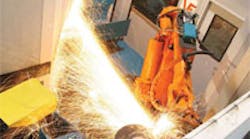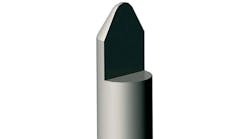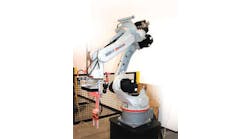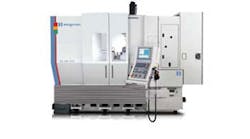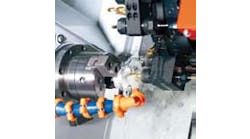Robotic cells keep Dolphin Casting strokes ahead of the competition.
Dolphin Casting manufactures Ping products, specifically casting putter and iron heads for golf clubs. To stay aloft in the golf products industry, the Phoenix, Arizona, shop needed to set its self apart and to stay ahead of the competition in the global marketplace.
In addition, manual labor used to produce casting putter and iron heads was difficult and tedious on employees. A cut-off operation also created the risk for injury as hands were always close to fastmoving saw blades. Robots were the allencompassing solution.
As a subsidiary of Karsten Manufacturing, Dolphin Casting provides investment castings, often referred to as the lost wax process, for the sporting goods, chemical, railroad and medical industries. The shop, which is the last of its kind producing golf products in any volume in the United States, relied on Vulcan Engineering of Helena, Ala., for expertise and suggestions as how to reduce operation costs and improve working conditions while maintaining quality and productivity.
Vulcan provides seamless integration of ABB Robotics robots with its equipment, controls and software, allowing the two companies to create a key foundry partnership. For Dolphin Casting, Vulcan integrated seven robotic cells to manufacture Ping’s clubs, creating a lean production process consisting of four grinding cells, two cut-off cells and one specialty cell with cut-off and grinding operations. The cells were also equipped with a close-tolerance software package to ensure quality standards.
These robot cells limit Dolphin Casting’s production variation and improve output quality. As a result of lean production, each line significantly reduces waste, work in process, and cycle times. “The robots have improved the quality of life for our workforce, while producing repeatable production processes,” commented Pete Poleon, general manager of Dolphin Casting. “And, Vulcan’s True Path software has dramatically shortened our programming time, giving us endless opportunities for the future.”
In operation, the robotic grinding cells de-gate the clubs by removing the metal that feeds the casting during solidification, while the specialty cells cut off and de-gate larger proprietary castings up to 24 in. in diameter. Robotic cut-off cells cut clubs from the runner system, after drilling the cores in the club hozzles (where the shaft attaches).
